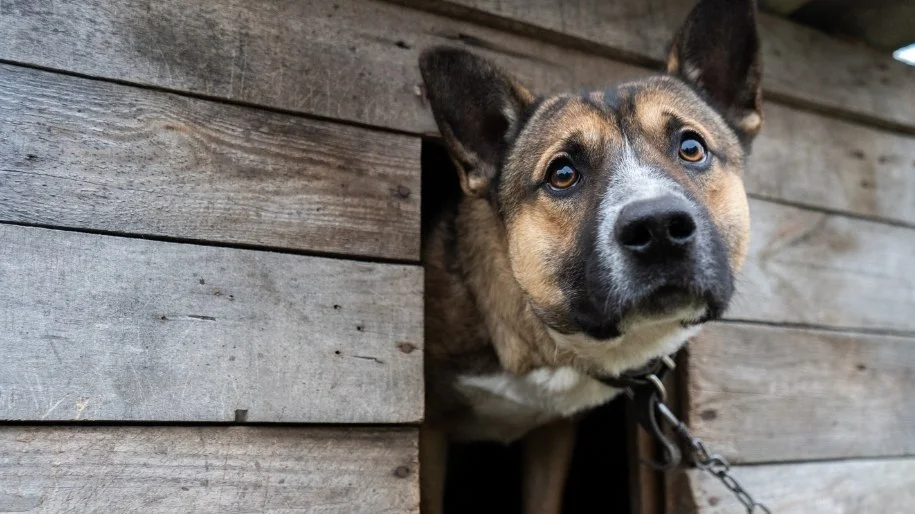PET CALENDAR
Unchain a Dog Month
January is Unchain A Dog Month, and in honor of this nationwide focus, we’re covering all things dog chaining today. Read on to discover why chaining a dog imay be considered abuse and how you can help dogs that live on a chain.
Is Chaining Dogs Abuse?
When you hear the term “dog chaining,” that generally means that a dog is tied up with a chain or rope and left alone day after day. This has many physical and mental ramifications for the dog — none of them good — and it is a form of animal cruelty and abuse.
Some cities and states have laws that either prohibit or limit dog chaining. In 2011, for instance, New York passed a law that made it illegal to tether dogs for over three hours in a 12-hour period. However, not all cities have these laws. In some cases, the decision of whether or not to chain a dog is up to the individual owner.
Let’s break down this issue a little further and look at a few key reasons why you shouldn’t chain your dog.
Chaining Causes Physical Issues
Dogs that are chained up can suffer from serious physical issues. Frostbite is a dangerous problem during cold weather; dogs can also become dehydrated if their water freezes over and they’re alone with no one to notice. In the summer, heatstroke is a very real danger, and insect bites are also an unpleasant issue. Puppies, older dogs, and dogs with short hair are especially at risk to develop health problems if they’re chained outside in the cold or the heat.
It’s also simply not good for dogs to be so sedentary — unable to stretch their legs and run. What’s more, dogs who are chained are vulnerable to be hurt by any people or other dogs who are passing by. Chained dogs can even die from strangulation if the rope or chain becomes wrapped around their neck, and they might contract an infection from their collar digging into their neck.
Chaining Causes Mental Health Issues
Chaining your dog has psychological ramifications in addition to physical ones. It’s not enough to simply provide your dog with food and shelter. Dogs need love, affection, and companionship just as much.
There’s a risk that chained dogs can become aggressive because they aren’t able to escape the situation if needed; they also tend to be extremely territorial over their small area. Chained dogs are bored and nervous, so sadly, it’s a logical step to developing aggression toward humans.
How Can You Help?
Don’t chain your own dog! Instead, find him a place to sleep and eat inside the house if possible, and give him lots of love (again, it’s especially important to bring very young or very old animals inside).
The only time it’s okay to chain your dog is for a short period and while the dog is supervised. In this case, never use a choke chain or choke collar. (Check your state’s laws before doing this; most states that prohibit dog chaining have some type of provision for temporary, supervised chaining.)
If you see someone else’s dog chained up, how can you help? If you know the owner, volunteer to watch their pet when needed, letting the dog sleep at your house or taking it to the dog park to run during the day. You can also bring the dog treats and toys.
Finally, if you notice that the dog does not have enough food, water, or a good shelter, call the authorities about neglect. Work with your city legislators to ban dog chaining in your area. PETA has many resources that can point you in the right direction to lobby for animal-friendly legislation.
Donate to or volunteer with organizations such as Fences For Fido, which provides free fences and doghouses for chained dogs. This nonprofit’s YouTube channel is full of videos showing happy dogs doing “zoomies” for the first time.
Finally, you can also be part of the solution by adopting a dog.
Consider Investing in Dog Insurance
Looking for more ways to keep your pup happy and healthy? Consider investing in a dog insurance policy with MetLife Pet Insurance.1 Our dog insurance policies can provide the coverage and care your furry family member deserves. Get your free quote today.
Protect your Dog
Nothing in this article should be construed as financial, legal or veterinary advice. Please consult your own advisors for questions relating to your and your pet’s specific circumstances.
1 Pet Insurance offered by MetLife Pet Insurance Solutions LLC is underwritten by Independence American Insurance Company (“IAIC”), a Delaware insurance company, headquartered at 485 Madison Avenue, NY, NY 10022, and Metropolitan General Insurance Company (“MetGen”), a Rhode Island insurance company, headquartered at 700 Quaker Lane, Warwick, RI 02886, in those states where MetGen’s policies are available. MetLife Pet Insurance Solutions LLC is the policy administrator authorized by IAIC and MetGen to offer and administer pet insurance policies. MetLife Pet Insurance Solutions LLC was previously known as PetFirst Healthcare, LLC and in some states continues to operate under that name pending approval of its application for a name change. The entity may operate under an alternate, assumed, and/or fictitious name in certain jurisdictions as approved, including MetLife Pet Insurance Services LLC (New York and Minnesota), MetLife Pet Insurance Solutions Agency LLC (Illinois), and such other alternate, assumed, or fictitious names approved by certain jurisdictions.

